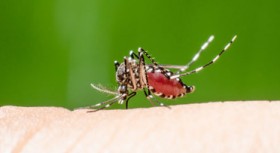Study IDs viral protein that causes dengue shock, shows potential as vaccine
UC Berkeley scientists have identified a key culprit responsible for the fluid loss and resulting shock that are the hallmark of severe — and potentially fatal — dengue virus infections.
A team of researchers led by molecular virologist Eva Harris, a UC Berkeley professor in the Division of Infectious Diseases and Vaccinology, presented new evidence that a guilty party is a protein secreted by cells infected with the mosquito-borne dengue virus. Called nonstructural protein 1 (NS1), it is the only one of the 10 viral proteins secreted by infected cells to circulate freely in the bloodstream.
To continue reading this story, please visit the UC Berkeley news website.

